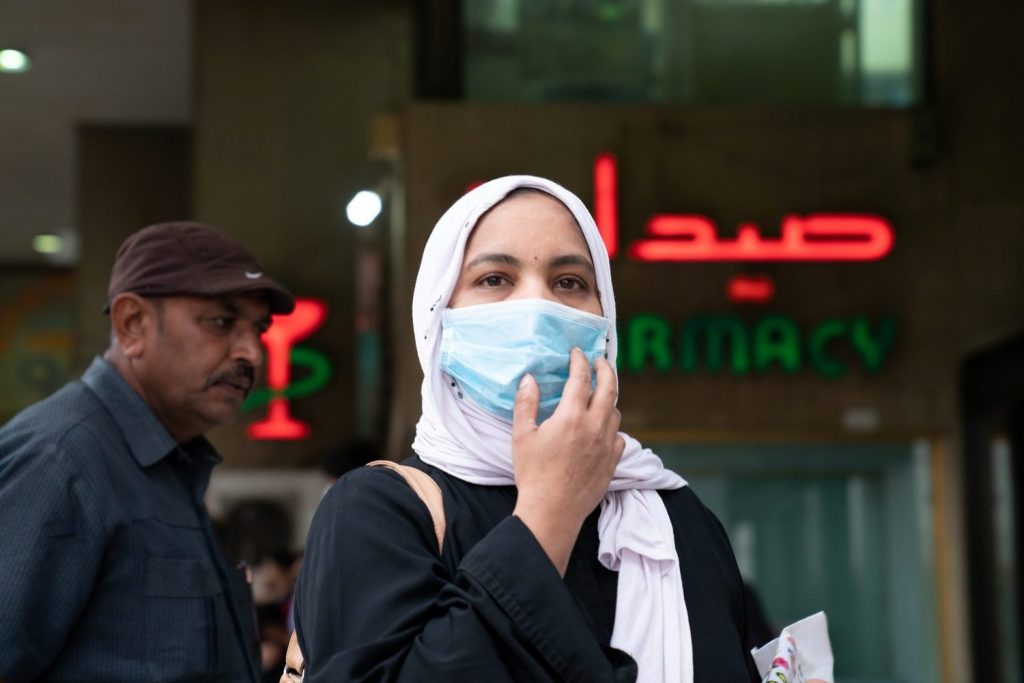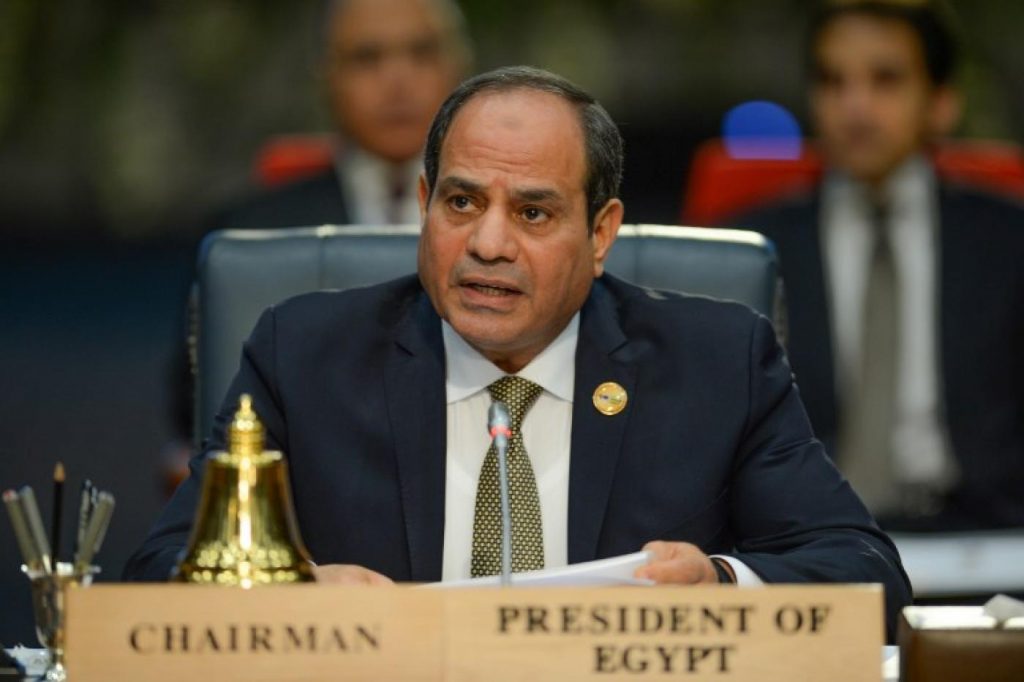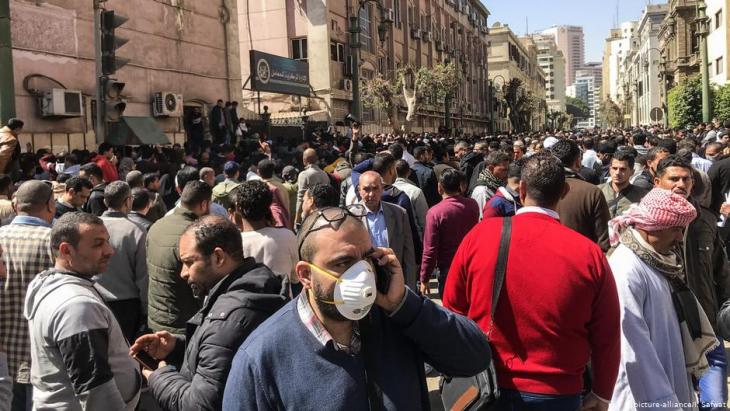Egypt is no stranger to recovering from the odd melange of democratic and authoritarian rule – but now that COVID-19 is the mix, Egypt is past the point of a social, political, and health-related recovery.

Democracy and Sisi’s COVID-19 Policies Do not Mix
In February 2020, Egypt was the first African state to document its first COVID-19 case. Once COVID-related cases began to increase, the mass public took to the government for answers, and instead of assurance or solutions, they received repercussions. Why were the Egyptian people punished and warned to keep silent after demanding answers from their government about the pandemic? Well, the answer is simple. Egypt does not owe its people answers because Egypt is not a democratic state. Egypt only carries the title of a Democratic Republic. Now that Egypt’s current president, Abdul Fattah al-Sisi, is facing COVID-19 head on, he is implementing illiberal responses to the global pandemic upon his people as they suffer from the misfortune and unfairness of being forced into silence and mistreatment at the hands of executive and military authority – the exact opposite of how a democratic regime should act.
Al-Sisi’s Four Undemocratic Responses to COVID:
- Constitutional Change

Egypt uses COVID-19 as an excuse to reform its constitution to allow leaders to secure and lengthen their term of executive power. After the 2011 Arab Spring and the resignation of ex-president Hosni Mubarak, Egypt was set to face a new era of freedom from a military-run regime; however, Egypt’s current president, Abdul Fattah al-Sisi is keeping Egypt down the same illiberal path it once trekked. It is possible that President Sisi may remain Egypt’s president until 2034 because of the ’emergency law’ Egypt initiated after the rise in COVID cases. President Sisi’s term was set to terminate in 2020, but if there are many votes on the proposal for constitutional modifications, it could spell serious trouble for Egypt’s human rights, potential democracy, and the freedom of the Egyptian people.
2. Misinformation
Based on the government’s response to its people, there appears to be a more severe pandemic than COVID-19; it is the circulation of actual and factual COVID-related information. Although Egypt does enforce a partial-curfew, Egypt’s government has a problem with releasing the severity of COVID-19 to the public. Pro-regime celebrities implement the idea that the spread of the virus in Egypt is a hoax to create a false sense of security and diminish the people’s loyalty to the regime. The governor of Sharqiya and the Minister of Health testified that COVID is “under control,” and the mass public must place their faith in the regime, but spikes in COVID-cases from Egypt says otherwise. The government went as far as to blame civilians for the ‘possible’ spread of the virus on their ‘inability’ to correctly social distance themselves. Unsurprisingly, any information that is disclosed to the public is considered ‘fake news.’
False numbered COVID-cases only allow Egypt to receive what is virtually considered ‘false praises’ from the international community. Reporter Joey Shea posted on The Tahrir Institute for Middle East Policy, declares that Egypt is distributing incorrect ‘fact-checks’ on the severity of COVID and how the virus is transmitted and treated. Ideas such as vinegar and the summer heat being key agents to kill the virus and flu vaccines being able to prevent the virus are some of Egypt’s false medical claims to control the public’s reaction to the quick-spreading pandemic. Egypt deemed itself as “untouchable” and distributed the idea of invincibility amongst the Egyptian population and media platforms. Furthermore, Egypt claimed that the U.S. was responsible for the spread of the virus. Egypt attempted to make a political power play by sending medical supplies (that were, in fact, limited) to Italy, China, and the U.S. However, once the truth behind the false allegations about COVID and the unfair distributions of limited medical supplies came out, the Egyptian people were outraged.
3. Repression of Information and Inhumane Threats

In no democracy should any freedom of the press and expression be limited or non-existent, but it seems Egypt’s ‘democracy’ is an exception. Journalists, medics, and civilians are being thrown into prison and treated as a threat if they argue against the regime’s claim that COVID-19 is under control and practically harmless. According to the article, Egypt Today, Egypt’s Attorney general, Hamada al-Sawy filed a lawsuit on Declan Walsh and Ruth Michaelson, individuals affiliated with the New York Times Cairo, for publishing ‘false’ information on the number of cases in Egypt. Walsh released that Egypt had more than 19,000 cases but later removed their comment because they were warned it would disrupt Egypt’s ‘public order.’ An Egyptian minister even recognized that the number of infections was five times higher with an increasingly high death toll in comparison to what Egypt originally announced. Frederick Deknatel posted on World Politics Review that authorities have no qualms in intimidating health workers, including doctors, and forcing them to work until they reach their literal dying breath.
Furthermore, if medics refuse to come to work, they will be considered “traitors” and will most likely face arrest, punishment, and a charge of terrorist affiliation. Amnesty International points out the severity of the situation. To keep Egypt’s real case numbers repressed and create the illusion of security and control, authority gives workers a choice between death or prison if they continue to spread the truth about Egypt’s horrible mishandling on COVID. “Health care workers in Egypt have been arrested, criminalized and prosecuted simply for daring to express their personal safety concerns and, in some cases, have been denied access to adequate health care,” remarks Philip Luther, a researcher at Amnesty. The threats from the regime and how they are mishandling their citizens is a serious concern for human rights. As the medical staff faces their regime head on in a losing battle, the question of Egypt’s health care system arises. If the Egyptian government cannot aid its people politically then can they provide proper healthcare?
4. Inadequate Healthcare
Egypt has faced many decades with the underinvestment of medical institutes and services. With the underinvestment of public healthcare, the mass public meets no other option but to opt for private medical services that are costly. With COVID-19 running rampant in Egypt and no proper guidelines being enforced to recede the spread, many working Egyptians are out in the cold and must find a way to receive basic health service, and if they cannot, then the consequences will be severe. With limited medical resources, the spreading of the pandemic is more than predictable. Public medical services must now rely on donations for equipment rather than regime funding. Egypt only has 17 private hospitals to cater solely for COVID-19 patients. It was predicted that by June, the hospitals and isolated facilities would hit maximum capacity. In response to Egypt’s lack of attention, its health sector forced most medical workers to seek opportunities abroad since Egypt’s healthcare workers are underpaid. In turn, the number of medical professionals decreases, and there becomes a deficit of health care practitioners. Now that Egypt’s flimsy grasp on the pandemic is public, officials began to expand testing. Public hospitals are expected to offer free testing only if individuals that show COVID related symptoms.
Suppose patients show minor signs of the virus? In that case, they are sent home to self-isolate and await results; if a test comes back positive or COVID symptoms appear severe, they are automatically admitted into a COVID designated hospital or facility. As COVID worsens, Egyptian citizens may completely turn their back on their regime and that may kick start a new fight for the democracy the Egyptians have been promised and have yet to receive. Currently, Egypt is facing an issue of centralized power from the executives – and looks to be one push away from possibly being a totalitarian state if it continues to strip the rights of the people and threaten basic human rights especially as Egypt’s grasp on COVID is almost non-existent.
What Happens Next? And is There A Chance for Democracy after COVID?
The simple answer to this question is no. It is not to say that Egypt does not have the potential of being a democracy; however, COVID cements the assumption that Egypt will potentially remain a pseudo-democracy. Egypt has the misfortune of being recognized as a failed democratic state. This North-African state has and will foreseeably resemble an authoritarian regime. As Egypt faces a global crisis, the voice of the public, public health, and constitutional order is jeopardized at the expense of the people. Ideally, Egypt should take this opportunity to repair its democracy because democracy is formed for the people and by the people to collaborate and address issues that cannot be solved efficiently either solely by the public or by the regime. Now that the administration is once more silencing innocent citizens who demanded liberation from the regime, there is a high possibility that Egypt will face a slide back into Responsive Democracy as it did with the protests leading to the resignation of ex-president Mubarak. It is not clear what Egypt’s plan for recovery is and if its political crisis will ever be cured or at least properly maintained alongside COVID. Still, change is never too far around the corner, and COVID may be the final push that Egypt’s pseudo-democracy needs to finally become a stable regime. If not, then Egypt has a long way to go in order to escape the authoritarian practices that continue to haunt them.
Destini Lewis is a senior International Relations major with a Developing World concentration and French minor, May 2021.
Bibliography
“Abdul Fattah Al-Sisi: Egyptian President May Rule until 2034.” BBC News. BBC, February 15, 2019. https://www.bbc.com/news/world-middle-east-47252315.
Afp. “Struggle, Fear and Heartbreak for Medical Staff on Virus Frontline.” Egypt Independent, April 15, 2020. https://egyptindependent.com/struggle-fear-and-heartbreak-for-medical-staff-on-virus-frontline/.
Amin, Shahira. “Egypt Battles COVID-19 amid Flood of Misinformation, Conspiracy Theories.” Al. Al-Monitor, June 3, 2020. https://www.al-monitor.com/pulse/originals/2020/03/egyptian-superstitions-jokes-on-coronavirus.html.
“A Call to Defend Democracy.” NATIONAL ENDOWMENT FOR DEMOCRACY, June 26, 2020. https://www.ned.org/call-to-defend-democracy/.
“Constitutional Amendments Could Extend Term of Egypt’s President to 2030 | CBC News.” CBCnews. CBC/Radio Canada, April 16, 2019. https://www.cbc.ca/news/world/egypt-amendment-referendum-constitution-president-1.5100315.
“COVID-19 in North Africa: Corona Proactivity in Tunisia, Trivialisation in Egypt.” Qantara.de, 2020. https://en.qantara.de/content/covid-19-in-north-africa-corona-proactivity-in-tunisia-trivialisation-in-egypt.
Deknatel, Frederick. “Even in a Pandemic, Egypt’s Sisi Only Has One Gear: Repression.” World Politics Review, July 20, 2020.
“Egypt Confirms First Case of New Virus.” AP NEWS. Associated Press, February 14, 2020. https://apnews.com/6167e3a2485713849a352fc1d03079e6.
“Egypt Sends Military Plane Filled with Medical Aid to Help U.S. with Coronavirus.” https://www.nationthailand.com, April 21, 2020. https://www.nationthailand.com/news/30386445?utm_source=homepage.
“Egypt to Offer Coronavirus Testing in All General Hospitals.” Reuters. Thomson Reuters, May 20, 2020. https://www.reuters.com/article/us-health-coronavirus-egypt/egypt-to-offer-coronavirus-testing-in-all-general-hospitals-idUSKBN22W2UI.
“Egypt: Health Workers Forced to Make Choice between ‘Death or Jail’.” Amnesty International, June 18, 2020. https://www.amnesty.org/en/latest/news/2020/06/egypt-health-care-workers-forced-to-make-impossible-choice-between-death-or-jail/.
Egyptian Streets. “Egypt’s COVID-19 Cases Reach Over 30,000.” Egyptian Streets, June 5, 2020. https://egyptianstreets.com/2020/06/05/egypts-covid-19-cases-reach-over-30000/.
Gaafar , Roba, Roba Gaafar, and Roba Gaafar is an Egyptian economic researcher based in Germany. “Why Egypt’s Coronavirus Response Failed.” Middle East Eye. MIddle East Eye, June 16, 2020. https://www.middleeasteye.net/opinion/coronavirus-egypt-sisi-response-failed-why.
Ismail, Amina. “Egypt’s Health Sector Races to Scale up Coronavirus Readiness.” Reuters. Thomson Reuters, April 1, 2020. https://www.reuters.com/article/us-health-coronavirus-egypt/egypts-health-sector-races-to-scale-up-coronavirus-readiness-idUSKBN21J6CU.
Khalil al-Anani Khalil al-Anani is a Senior Fellow at the Arab Centre for Research and Policy Studies in Washington DC. He is also an associate professor of political science at the Doha Institute for Graduate Studies. You can follow him on Twitter: , Khalil al-Anani, and Khalil al-Anani is a Senior Fellow at the Arab Centre for Research and Policy Studies in Washington DC. He is also an associate professor of political science at the Doha Institute for Graduate Studies. You can follow him on Twitter: @Khalilalanani. “Egypt Is Heading for One-Man Rule, Unless This Constitutional Calamity Is Stopped.” Middle East Eye, 2019. https://www.middleeasteye.net/opinion/egypt-heading-one-man-rule-unless-constitutional-calamity-stopped.
Mandour, Maged. “Repression and Coronavirus Response in Egypt.” Carnegie Endowment for International Peace, July 15, 2020. https://carnegieendowment.org/sada/82304.
Manfreda, Primoz. “Is Egypt a Democracy?” ThoughtCo, July 16, 2018. https://www.thoughtco.com/is-egypt-a-democracy-2352931.
“NYTimes, Guardian Reporters in Cairo Sued for Publishing Misinformation on Covid-19 Cases in Egypt.” EgyptToday, March 16, 2020. https://www.egypttoday.com/Article/1/82682/NYTimes-Guardian-reporters-in-Cairo-sued-for-publishing-misinformation-on.
Shea, Joey, Displaced Syrians are key to the political change that Syria needs, Analysis 07/30/2020, Due Process and COVID-19 in the MENA Region, Analysis 07/24/2020, No Funding and No Policy: Lebanon’s Refugee Population amid COVID-19 and an Economic Crisis, Analysis 07/23/2020, et al. “Misinfo, Disinfo, and Fake News in Egypt’s COVID-19 ‘Infodemic.’” TIMEP. The Tahrir Institute for Middle East Policy, May 5, 2020. https://timep.org/commentary/analysis/misinfo-disinfo-and-fake-news-in-egypts-covid-19-infodemic/.
